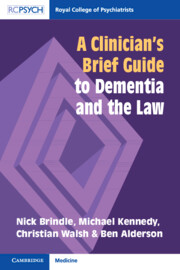Book contents
- A Clinician’s Brief Guide to Dementia and the Law
- A Clinician’s Brief Guide to Dementia and the Law
- Copyright page
- Contents
- Preface
- Common Abbreviations
- Chapter 1 Dementia
- Chapter 2 Dementia
- Chapter 3 Dementia
- Chapter 4 The Mental Capacity Act 2005
- Chapter 5 The Mental Health Act 1983
- Chapter 6 The Care Act 2014
- Chapter 7 Assessment of Capacity
- Chapter 8 The Diagnosis of Dementia
- Chapter 9 Care and Treatment Issues and the Law
- Chapter 10 Deprivation of Liberty
- Chapter 11 Discharge from Hospital
- Chapter 12 Abuse and Safeguarding
- Chapter 13 The Courts and Tribunals
- Chapter 14 The Interface between Dementia and the Criminal Justice System
- Book part
- References
- Index
Chapter 3 - Dementia
The Legal Framework
Published online by Cambridge University Press: 20 July 2023
- A Clinician’s Brief Guide to Dementia and the Law
- A Clinician’s Brief Guide to Dementia and the Law
- Copyright page
- Contents
- Preface
- Common Abbreviations
- Chapter 1 Dementia
- Chapter 2 Dementia
- Chapter 3 Dementia
- Chapter 4 The Mental Capacity Act 2005
- Chapter 5 The Mental Health Act 1983
- Chapter 6 The Care Act 2014
- Chapter 7 Assessment of Capacity
- Chapter 8 The Diagnosis of Dementia
- Chapter 9 Care and Treatment Issues and the Law
- Chapter 10 Deprivation of Liberty
- Chapter 11 Discharge from Hospital
- Chapter 12 Abuse and Safeguarding
- Chapter 13 The Courts and Tribunals
- Chapter 14 The Interface between Dementia and the Criminal Justice System
- Book part
- References
- Index
Summary
Most older people do not need any special legal support or protection. They are formed of diverse groups and clearly not all are vulnerable to abuses of one form or another. However, some older people are evidently more at risk than others because of ill-health, disability or dementia, or because of their dependency. They may require protection from physical or mental abuse and misuse of their money or property, and at some stage they may need help with making decisions. They may also require legal protection in respect of the provision of treatment or care, especially if the care arrangements involve them being deprived of their liberty.
Older people, especially those with dementia, may require support from diverse agencies, such as housing and social services, and are the main users of the NHS. Discrimination, victimisation or neglect of older people within the health and social care system raise important issues under human rights law, along with other domestic law or international law obligations. The Acts that are outlined in this chapter are aimed at protecting the basic human rights of people at risk, who share with all of us the right to live our lives as we choose.
Keywords
- Type
- Chapter
- Information
- A Clinician's Brief Guide to Dementia and the Law , pp. 16 - 25Publisher: Cambridge University PressPrint publication year: 2023

